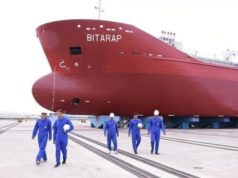The Port of Baku, strategically located on the Caspian Sea, is expanding to meet global trade demands while prioritising sustainability and investing in local projects.
The Port of Baku in Azerbaijan is the oldest and most strategic port on the Caspian Sea. Set on a trading route between the east and west it’s a global destination for transport and logistics, and connectivity is key to its success.
Taleh Ziyadov is the director-general of the Port of Baku and says that global disruptions and wars have highlighted the importance of supply chains. He told Euronews because the port is located in the middle of Central Eurasia, it is a major connector in all directions. “Now, the Port of Baku is really coming back as the 21st-century five-star hub that is not only going to connect the continents, but also contribute directly to the economic development in the region,” he added.
The port’s stakeholders have clear ambitions to adapt, grow and meet global escalating trade demands. Last year, its total handling volume reached over 7.3 million tonnes – a 51% increase since 2020. Ziyadov added: “We have a very good operational team that has KPIs on how fast they should be handling the cargo. And I think these have contributed really to the increase of cargo and the trust that lots of international clients have put in the Port of Baku.”
Located in Alat – 70km from Azerbaijan’s capital Baku – it has 13 berths, including a “roll-on, roll-off” (ro-ro) quay, a ferry terminal, and a general cargo terminal. As well as terminals that deal with consumer goods, cars, and commodities, a fertiliser terminal is also being developed, which will include warehouses capable of storing 60,000 tonnes of different fertilisers.
Advancing technologies, digitalisation and automation are high on the agenda for the port’s development. Eugene Seah, COO of the Port of Baku, says: “Digitalisation is unavoidable, (it’s) part of the development that is taking place. So we are taking it seriously and we are going to share and make sure that this integration takes place along with our neighbours as well.”
The port is also adopting environmental sustainability policies and practices to reduce its ecological and ecosystem impact. This includes implementing a wastewater plant that converts wastewater into technical water. The wastewater treatment system is made up of five modules that use Rotating Biological Contactor (RBC) technology, each capable of cleaning 500m3 of sewage water daily, effectively catering to the needs of up to 2,500 employees.
In addition, the port joined the UN Global Compact last year, and it also aims to have zero carbon dioxide emissions by 2035. Seah explained that the Port of Baku wants to “provide an example to other ports in the region to be a leading so-called advocate of green policies, green procedures and operation processes to mitigate carbon emissions.”
“We recently completed a carbon footprint, which confirmed our suspicions that vessels emitted about 60% of all carbon emissions, and then followed (this) up with the trucks and also with the equipment that we have,” he added. “This gave us the baseline for a clear strategic blueprint on how to reduce emissions to zero maybe in about 15 to 20 years.”
The nearby Alat Ecopark is an extension of the Port of Baku’s green initiatives that stretch beyond its port operations, and it is powered by energy-efficient facilities. In addition, a robotics and coding programme for local schoolchildren has started in the port, which aims to educate the technology manufacturers of the future.
The port’s vision is not only based on trade but also on environmental and wildlife protection. More than 40 species of birds live in the harbour basin, including 200 flamingos that migrate to the port from Africa every year. In addition, the port is expanding its green zones having planted more than 60,000 trees and plants, with a further 100,000 more planned in the Alat area by 2025.
“We have actually explored other things with our local university, Ada University, on some programmes to have some joint projects to look at,” said Seah. “Possibly drip irrigation so that we can promote this kind of greenery, create some buffer zones, and promote the wildlife in this region.”
With further expansion plans taking shape, the Port of Baku is working to cement its role as a global leader in trade and logistics. Director-general, Ziyadov, says: “The next five years are going to be extremely positive because we have arrived at a time when international business is gradually getting into this supply chain, showing interest. They want to expand.”







